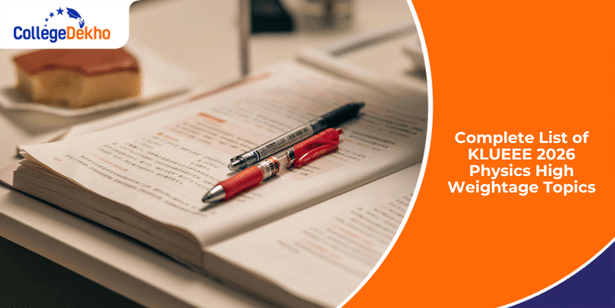
KLUEEE is the entrance exam for B.Tech admissions at KL University . For students preparing in 2025 for the 2026 exam, Physics remains the most significant subject, carrying the highest weightage in the paper. In the 2024 exam, 80 out of 160 questions were from Physics, highlighting its critical role in securing a top rank. By focusing on chapters with the most weight, students can plan an efficient preparation strategy. This guide presents the KLUEEE 2026 Physics high-weightage topics, chapter-wise weightage, and effective strategies for structured preparation.
Why Physics Weightage Matters in KLUEEE
Physics plays a pivotal role in KLUEEE. In the 2024 exam, 80 out of 160 questions were from Physics, which means nearly 50% of the paper depends on this subject. Strong performance in Physics can therefore provide a significant advantage in overall ranking. By identifying and focusing on high-weightage chapters, students preparing in 2025 for the 2026 exam can optimize their study time, concentrate on topics that yield maximum marks, and improve accuracy in problem-solving.
High-Weightage Physics Topics for KLUEEE 2026
KLUEEE 2025 comprises 75 questions, with Physics accounting for 25 questions. The syllabus spans topics from both Class 11 and Class 12 Physics, emphasizing conceptual clarity and problem-solving skills. Based on the syllabus and previous exam patterns, the following topics are anticipated to carry higher weightage:
| Physics Area | Key Topics | Approx. Weightage | Why Important |
|---|---|---|---|
| Mechanics (Class 11) | Laws of Motion, Work, Energy, Power, Gravitation, Oscillations, Rotational Motion | 25–30% | Forms the foundation of Physics. Integral to understanding various physical phenomena. Maximum questions come from this area. |
| Electrostatics & Current Electricity | Electric Charges, Electric Field, Potential, Capacitance, Current, Ohm's Law, Circuits | 20% | Crucial for understanding electrical circuits. Frequently tested in competitive exams with numerical problems. |
| Modern Physics & Semiconductors | Dual Nature of Matter, Photoelectric Effect, Atoms, Nuclei, Nuclear Physics, Semiconductor Devices | 15% | Pivotal in technological advancements. High scoring potential with proper formula revision. |
| Optics | Reflection, Refraction, Lenses, Prism, Interference, Diffraction, Polarization | 10–15% | Visually intuitive branch with practical applications. Mix of theory and numerical questions. |
| Magnetism & Electromagnetic Induction | Magnetic Field, Magnetic Effects of Current, Faraday's Law, Lenz's Law, Alternating Current | 10–12% | Essential for understanding electromagnetic applications. Conceptual and formula-based questions. |
| Thermodynamics & Heat | Laws of Thermodynamics, Heat Transfer, Thermal Expansion, Thermal Radiation | 8–10% | Fundamental to understanding energy systems. Numerical-heavy chapter. |
| Waves & Sound | Simple Harmonic Motion (SHM), Wave Motion, Sound Waves, Doppler Effect | 5–8% | Moderate weightage but easy scoring if concepts are clear. |
You might find this helpful: What is a Good Score in KLUEEE 2026
KLUEEE Physics Preparation Tips & Strategy
To excel in KLUEEE Physics, students preparing for the 2026 exam should combine chapter-wise focus with strategic practice. Based on 2025 trends, the following preparation approach is recommended:
1. Focus on High-Weightage Chapters: Prioritize Mechanics, Electrostatics & Current Electricity, and Modern Physics, as these topics contribute the largest share of marks. Covering them first ensures maximum scoring potential.2. Solve Previous Year Papers: Analyze the 2023–2025 KLUEEE papers to understand question types, frequently asked topics, and patterns in numerical problems. This helps in targeted preparation and time management.
3. Revise Key Formulas and Concepts Regularly: Maintain a formula sheet for all high-weightage chapters. Daily revision reinforces memory and allows faster problem-solving during the exam.
4. Practice Numerical Problems Extensively: Mechanics, Electricity, and Modern Physics involve calculations that can be tricky. Regular practice improves accuracy, speed, and conceptual understanding.
5. Refer to NCERT and Standard Reference Books: NCERT provides clear conceptual explanations for Class 11–12 topics, while reference books help in practicing advanced problems and strengthening application skills.
6. Take Timed Mock Tests: Simulate actual exam conditions using mock tests. Focus on attempting high-weightage chapters first, track time, and identify areas needing improvement.
Physics carries the highest weightage in KLUEEE, accounting for nearly half of the paper. For students preparing in 2025 for the 2026 exam, mastering high-weightage chapters such as Mechanics, Electrostatics & Current Electricity, and Modern Physics is essential to secure top marks. By focusing on these topics, practicing numerical problems, revising formulas regularly, and solving previous year papers, students can optimize their preparation, improve accuracy, and enhance their overall rank in the exam.
Are you feeling lost and unsure about what career path to take after completing 12th standard?
Say goodbye to confusion and hello to a bright future!

FAQs
Use the weightage table to decide which topics deserve more revision time. Start with chapters like Mechanics, Electricity, and Modern Physics since they carry maximum marks. Then move to medium-weightage topics like Optics and Thermodynamics. Revise low-weightage chapters last, just for final coverage.
You should study both, but Class 11 topics like Mechanics and Waves carry more weightage. Class 12 topics such as Modern Physics and Electricity are also high scoring. A balanced approach is best, but giving extra time to high-weightage Class 11 topics is smart.
Yes, Modern Physics is very important for KLUEEE. It contributes about 15% of the Physics section. Questions from Semiconductors, Dual Nature of Matter, Atoms, and Nuclei are often direct and scoring. Ignoring this chapter can cost you valuable marks in the exam.
Mechanics is the most important part of KLUEEE Physics. Out of 80 Physics questions, about 20 to 25 usually come from Mechanics. This makes it the single biggest scoring area, so you must give extra time to strengthen concepts and practice problems.
NCERT is important for building basics, but it is not enough alone. You should also practice from reference books like H.C. Verma or D.C. Pandey. Along with NCERT, solving past papers and mock tests will give you exam-level practice and improve your speed.
Mechanics carries the highest weightage with around 25–30% of questions. After that, Electrostatics and Current Electricity contribute about 20%, and Modern Physics adds nearly 15%. These three areas together cover most of the Physics paper and should be your top priority.
Was this article helpful?




















Similar Articles
Predicted Marks Required to Score 99 Percentile in JEE Main 2026
Total B.Tech Seats in IITs vs JEE Advanced Qualifiers: Is there a need to Increase Seats in IITs?
Expected JEE Main Percentile required to be Eligible for JEE Advance 2026
KCET Magnetism and Matter Weightage 2026
Are GUJCET 2026 Exam Centres located only in Gujarat?
KCET Semiconductor Electronics Weightage 2026